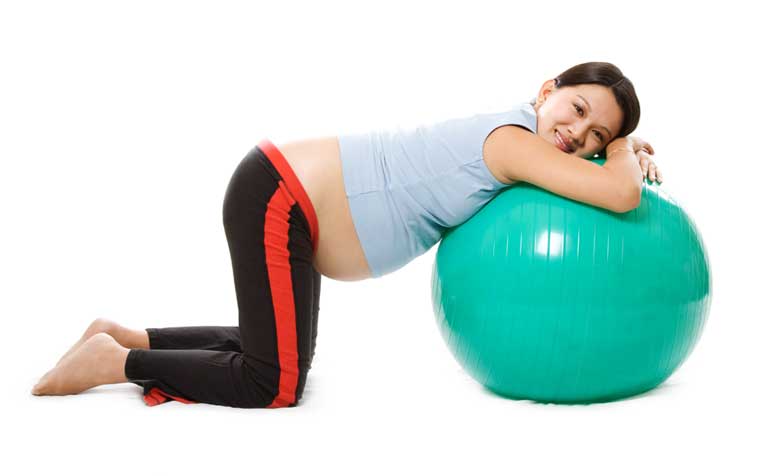
Simple yoga poses and stretches on an exercise ball can help relieve backache, constipation and swelling.
Keeping fit while you’re expecting has many advantages and makes getting back to your pre-pregnancy weight easier
Unless a health condition or complication develops that demands complete bedrest or hospitalisation, women can – and should – do some form of exercise during pregnancy.
“Staying fit during pregnancy helps women cope better with the physical demands of pregnancy, labour and motherhood,” shares Dr Tan Wei Ching, Senior Consultant from the Department of Obstetrics and Gynaecology at Singapore General Hospital (SGH), a member of the SingHealth group.
Regular exercise, she adds, builds bones and muscles, and exercising at least 30 minutes, five to seven days a week can benefit in a variety of ways. This includes:
- Relieving backache, constipation, bloating and swelling
- Preventing or treating gestational diabetes – the diabetes that some women develop during pregnancy, which often goes away after delivery.
- Increases energy, improves mood, posture and sleep, and promotes muscle tone, strength and endurance.
“Medical research has shown that most women can safely continue to exercise throughout pregnancy as long as they make sensible adjustments to their routine. For women who were inactive before conceiving and who wish to get into better shape before the baby comes, it is even safe to begin exercise programmes during pregnancy,” says Dr Tan. However, “a pregnant woman should not exercise to lose weight during pregnancy".
Before you begin exercising
Before starting an exercise programme, a pregnant woman should ask her doctor for personal exercise guidelines based on her medical history. “Unless hospitalisation or complete bedrest is advised, most patients will be able to perform simple exercises like brisk walking even if they have diabetes or hypertension,” says Dr Tan.
However, should the woman develop placenta previa, a complication where a low-lying placenta covers part or all of the cervix, then exercise is off limits.
Suitable exercises for pregnant women
“Strenuous exercises can cause some uterine tightening and bleeding, which may mean an early delivery, especially if the bleeding is massive,” says Dr Tan. Exercise is generally safe during pregnancy, although it can involve positions and movements that may be uncomfortable or tiring for pregnant women. As the pregnancy progresses, the intensity should be reduced as “the actual level of difficulty is increased with the added weight,” she explains.
- “Walking is a great way to start an exercise programme,” says Dr Tan, adding that brisk walking is an excellent low-impact total body workout.
- Swimming is another good form of exercise as it works many muscles while the water supports the body’s weight, minimising the risk of injury and muscle strain.
- Aerobics keeps the heart and lungs strong; low impact and water aerobics classes are good for pregnant women.
- Cycling provides a good aerobic workout too, but the growing belly can affect balance, making pregnant women more prone to falls. Stationary or recumbent (where the rider is in a reclining position) biking may be better in the later stages of pregnancy.
Less suitable sports for pregnant women
- Runners should be able to keep up with their running during pregnancy, with slight adjustments made to their routine as the pregnancy progresses. Strength training can make muscles stronger and help prevent some of the aches and pains common in pregnancy.
- Racquet sport players can continue to play but in moderation. Some racquet sports such as badminton, tennis and racquetball involve rapid movements and changes in direction. These rapid twists and turns may make pregnant women prone to falls.
- Another sport where there is a risk of injury and falls is skiing. Skiing in very high mountains (above 3,000m) may also lead to altitude sickness which makes it harder for a pregnant woman to breathe and may cut down on the foetus’ supply of oxygen.
- Contact sports like ice hockey, soccer and basketball can also result in harm to the pregnant woman and the foetus, while there is a risk of decompression sickness in scuba diving. Such activities should be avoided during pregnancy.
Read on for information on exercises that are appropriate for each trimester of your pregnancy.
Ref: U11
Check out our other articles on pregnancy:
17 Pregnancy Diet Myths Busted!
Pregnancy Skin Changes and What to Do
Contributed by


















 Get it on Google Play
Get it on Google Play